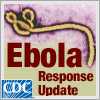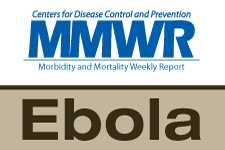Audio
Podcasts
CDC Ebola Response Update Podcasts
 Listen to/view on your computer or download them for information about the 2014 West Africa Ebola outbreak when and where you want it.
Listen to/view on your computer or download them for information about the 2014 West Africa Ebola outbreak when and where you want it.
Click on a Spot Title to See Transcript
Audio PSA from First Lady of Guinea, Hadja Djene Kaba Condé
Washing hands well can help protect yourself and your family from Ebola and also other diseases. Ebola is a very serious disease. But it is possible to survive and heal with proper medical treatment. If you or someone you know thinks he has the disease, go to the hospital immediately for treatment. This is your best chance of surviving the disease and also to protect the people around you so they do not contract Ebola. Do not risk your life or that of your family and loved ones. If you think you have ebola, go to the hospital right away.
PSAs for West African Communities in the U.S.
PSA #1: Preparing for a visit with family or friends traveling from West Africa
Will your family or friends from West Africa be visiting soon? Learn about Ebola.
Message 1: Learn about the risk of exposure.
People can only be exposed to Ebola if they have contact with blood or body fluids of a person sick with Ebola without wearing the right protective clothing. Body fluids include urine, sweat, saliva, feces, vomit, and semen. Ebola is not spread through air or water or, in general, through food; however, in Africa, Ebola may be spread through preparing bushmeat or having contact with infected animals.
If any of your friends or family members traveled from West Africa and were exposed to Ebola, call a doctor, even if they don’t have symptoms.
Countries in West Africa are working to make sure that people who have Ebola or have been exposed to Ebola don’t get on airplanes. Make sure your friends and family who are planning to visit know that they shouldn’t fly if they are sick or have been exposed within the previous 21 days.
For more information, call 1-800-CDC-INFO or visit c-d-c-dot-gov-slash-ebola.
Message 2: Learn the symptoms of Ebola.
Symptoms of Ebola include fever, severe headache, muscle pain, vomiting, diarrhea, stomach pain, and unexplained bleeding or bruising. The time from exposure to Ebola to the time when symptoms appear is 2 to 21 days.
If any of your friends or family members have traveled from West Africa and were exposed to Ebola, call a doctor even if they don’t have symptoms. If someone has symptoms, call the doctor before going to the office or emergency room and tell the doctor that someone who has recently traveled from West Africa has symptoms of Ebola. Advance notice will help the doctor provide care and protect other people. People with symptoms shouldn’t go anywhere except to the doctor’s office or hospital and should limit contact with other people until the doctor says it’s okay.
For more information, call 1-800-CDC-INFO or visit c-d-c-dot-gov-slash-ebola.
PSA #2: Returning from a visit with family or friends in West Africa
Are you returning from a visit with family and friends in West Africa and worried that you may have been exposed to Ebola?
Message 1: Learn how people are exposed to Ebola.
People can only be exposed to Ebola if they have contact with blood or body fluids of a person sick with Ebola without wearing the right protective clothing. Body fluids include urine, sweat, saliva, feces, vomit, and semen. Ebola is not spread through air or water or, in general, through food; however, in Africa, Ebola may be spread through preparing bushmeat or having contact with infected animals.
If you traveled from West Africa and were exposed to Ebola, call a doctor even if you don’t have symptoms. If you weren’t exposed to Ebola but were in an area affected by an outbreak, you should still monitor your health for 21 days after your return. During this time, you can continue your normal activities, including work.
For more information, call 1-800-CDC-INFO or visit c-d-c-dot-gov-slash-ebola.
Message 2: Learn about monitoring your health after you return.
To monitor your health, take your temperature every morning and evening.
If your temperature is above 101.5 degrees Fahrenheit and you have severe headache, muscle pain, vomiting, diarrhea, stomach pain, or unexplained bleeding or bruising, call your doctor immediately. Limit your contact with other people until the doctor tells you otherwise. Call your doctor before going to the office or emergency room and tell your doctor that you have recently traveled from West Africa have symptoms of Ebola. Advance notice will help the doctor provide care and protect other people. Don’t go anywhere except to the doctor’s office.
For more information, call 1-800-CDC-INFO or visit c-d-c-dot-gov-slash-ebola.
PSA #3: Preparing for a visit to family or friends in West Africa
Learn the latest Ebola outbreak facts and travel alerts before you visit family and friends in West Africa.
Message 1: Learn about the risk of exposure.
CDC urges all U.S. residents to avoid nonessential travel to Guinea, Liberia, and Sierra Leone because of outbreaks of Ebola in those countries.
If you must travel to one of these countries, you can only be exposed to Ebola if you have contact with blood or body fluids of a person sick with Ebola without wearing the right protective clothing. Body fluids include like urine, sweat, saliva, feces, vomit, and semen. Ebola is not spread through air or water or, in general, through food; however, in Africa, Ebola may be spread through preparing bushmeat or having contact with infected animals.
If you are exposed to Ebola, you won’t be able to travel on a commercial flight to the United States for 21 days, in case you develop symptoms. If you get sick with Ebola, you might need to have a medical evacuation back to the United States, which can be extremely expensive. The health care systems in these countries are severely strained by the outbreak, and you may not be able to get medical care for Ebola or other health problems if you need it. Please consider delaying your travel until after the Ebola outbreak is under control.
For more information, call 1-800-CDC-INFO or visit c-d-c-dot-gov-slash-ebola.
Message 2: Learn how to protect yourself from Ebola when traveling.
If you must travel to an area with an Ebola outbreak, protect yourself. Don’t touch the blood and body fluids of people who are sick with Ebola or items that may have come in contact with blood and body fluids. Practice careful hygiene by washing your hands with soap and water or an alcohol-based hand sanitizer. Avoid contact with bats and nonhuman primates like monkeys and don’t prepare meat from these animals. Avoid funeral or burial rituals that require handling the body in case that person had Ebola.
Make a plan before your trip for how you will get health care if you need it. If you are being treated for a health problem other than Ebola, avoid hospitals where Ebola patients are being treated. The U.S. Embassy or consulate is often able to provide advice on healthcare facilities, but you should be aware that health care might not be available in some countries right now.
Seek medical care immediately if you develop fever, headache, muscle pain, diarrhea, vomiting, stomach pain, or unexplained bruising or bleeding, which could be symptoms of Ebola. Limit your contact with other people and don’t go anywhere other than a doctor’s office or hospital.
For more information, call 1-800-CDC-INFO or visit c-d-c-dot-gov-slash-ebola.
PSA #4: Well but worried about family and friends in West Africa
Are you worried about your family and friends who live in countries with Ebola outbreaks?
Message 1: Learn how your family and friends can protect themselves.
If your family or friends live in a country with an Ebola outbreak, advise them to take steps to protect themselves. Tell them to practice careful hygiene by washing their hands often with soap and water or an alcohol-based hand sanitizer. Don’t touch the blood and body fluids of people sick with Ebola or items that may have come in contact with an infected person’s blood or body fluids. Avoid funeral or burial rituals that require handling the body in case that person had Ebola. Avoid contact with bats and nonhuman primates like monkeys. Don’t prepare meat from these animals.
Advise your family or friends to seek medical care immediately if they develop fever, headache, muscle pain, diarrhea, vomiting, stomach pain, or unexplained bruising or bleeding, which are symptoms of Ebola. Someone with symptoms should limit their contact with other people and only go places where public health authorities say it’s okay.
For more information, call 1-800-CDC-INFO or visit c-d-c-dot-gov-slash-ebola.
Message 2: Learn how Ebola spreads.
Ebola is spread when a sick person's blood or body fluids, such as, urine, sweat, saliva, feces, vomit, and semen, enter another person’s body through broken skin or through the eyes, nose, or mouth. The virus also can spread through contact with sharp objects, like needles and syringes, contaminated with infected body fluids.
Ebola isn’t spread through air or water or, in general, through food; however, in Africa, Ebola may be spread through preparing bushmeat or contact with infected animals.
For more information, call 1-800-CDC-INFO or visit c-d-c-dot-gov-slash-ebola.
Radio Spots for West African Communities: Various Languages
Spot 1. English: "It's probably malaria, not Ebola!" --- French: « C’est probablement la malaria, pas Ebola! »
English
One difficult thing about Ebola is that the signs – sudden fever, diarrhea, vomitting – these are shared by other diseases. So, perhaps it's not Ebola. It could be malaria. Or perhaps typhoid fever. So, it's quite difficult for anyone, except a health care worker, to say definitively 'Yes, it is Ebola,' or 'No, it is not Ebola.'
So, if you have sudden fever, diarrhoea or vomiting, you should go to the health centre, because, no matter the cause, you can receive help there.
And remember: with the right information, and together with our health care workers, we can protect ourselves from Ebola.
French
Une des difficultés au sujet d’Ebola, c’est que les symptômes: fièvre soudaine, diarrhée, vomissements, sont communs à d’autres maladies. Donc, ce n’est peut-être pas Ebola. C’est peut-être la malaria ou la fièvre typhoïde. C’est assez difficile pour quiconque, à l’exception d’un professionnel de la santé, de dire de façon définitive « Oui, c’est Ebola » ou «Non, ce n’est pas Ebola ».
Donc, si vous souffrez d’une fièvre soudaine, de diarrhée, ou de vomissements, vous devez vous rendre dans un centre de santé, car, qu’elle qu’en soit la raison, vous pouvez y recevoir de l’aide.
Rappelez-vous : avec les bonnes informations et avec l’aide de nos professionnels de la santé, nous pouvons nous protéger contre Ebola.
Spot 2. English: Where does Ebola live? --- French: Où Ebola est-il présent ?
English
The Ebola virus lives in the bats and does not make them sick. The Ebola virus is released from the bats from time to time and can infect monkeys, chimpanzees, and humans, and other wild animals.
So, can Ebola be caused by witchcraft or a curse, or any other cause? No. Remember: the Ebola virus lives in bats.
And remember: with the right information, and together with our health care workers, we can protect ourselves from Ebola.
French
Le virus Ebola est présent chez les chauves-souris et ne les rend pas malades. Le virus Ebola est parfois libéré par les chauves-souris et peut infecter les singes, les chimpanzés, d’autres animaux sauvages, et aussi les êtres humains.
Est-ce qu’Ebola peut être causé par la sorcellerie ou une malédiction, ou toute autre cause? Non. Rappelez-vous : Ebola est présent chez les chauves-souris.
Rappelez-vous : avec les bonnes informations et avec l’aide de nos professionnels de la santé, nous pouvons nous protéger contre Ebola.
Spot 3. English: If there is no fever, there is no Ebola --- French: S’il n’y a pas de fièvre, il n’y a pas Ebola
English
If a person has no fever, he or she can move about, touch others, ride the bus, take a taxi. And they cannot pass Ebola to other people. A person who develops a fever, however, can pass Ebola to others. Once they have recovered and been discharged, they are free from Ebola, and should be welcomed back into the family and the community.
And remember: with the right information, and together with our health care workers, we can protect ourselves from Ebola.
French
Si une personne n’a pas de fièvre, elle peut se déplacer librement, toucher d’autres personnes, monter dans le bus, ou prendre un taxi. Elle ne peut pas transmettre Ebola à d’autres personnes. Mais une personne qui développe une fièvre peut transmettre Ebola à d’autres personnes.
Une fois guérie et autorisée à quitter l’hôpital, cette personne est libérée du virus et peut à nouveau être accueillie dans sa famille et sa communauté.
Rappelez-vous : avec les bonnes informations et avec l’aide de nos professionnels de la santé, nous pouvons nous protéger contre Ebola.
Spot 4. English: Who is at risk for Ebola? --- French: Quelles sont les personnes à risque pour Ebola ?
English
Who is at risk of getting Ebola? It’s the people who are in contact with those who are sick from Ebola, including family members and health care workers. And also people who are in contact with wild animals, including bats and monkeys, or fruit partially eaten by bats (bat mot).
Do people have any risk of getting Ebola by riding the bus? No.
Do people have any risk of getting Ebola by wearing a helmet? No.
And remember: with the right information, and together with our health care workers, we can protect ourselves from Ebola.
French
Qui risque de contracter le virus Ebola ? Ce sont les personnes en contact avec les malades atteints par Ebola, y compris les membres de la famille et les professionnels de la santé. Ce sont aussi les personnes en contact avec les animaux sauvages, notamment les chauves-souris et les singes, ou les fruits qui ont été en partie mangés par les chauves-souris (mot chauve-souris).
Les personnes risquent-elles de contracter le virus Ebola en prenant le bus ? Non.
Les personnes risquent-elles de contracter le virus Ebola en portant un casque ? Non.
Rappelez-vous : avec les bonnes informations et avec l’aide de nos professionnels de la santé, nous pouvons nous protéger contre Ebola.
Spot 5. English: Ebola transmission within the family --- French: La transmission d’Ebola au sein de la famille
English
Many times, when a man becomes sick with Ebola, it is the woman who cares for him. And then what happens? Then, the woman becomes sick. And then who cares for the woman? The grand-mother or a family member.
Then, the children can become infected, as well as others having direct contact with the sick person.
This is how Ebola can pass from one person to another in the community.
And remember: with the right information, and together with our health care workers, we can protect ourselves from Ebola.
French
Très souvent, lorsqu’un homme contracte Ebola, c’est sa femme qui prend soin de lui. Et qu’arrive-t-il ensuite ? Ensuite, sa femme devient malade. Qui prend alors soin de la femme ? La grand-mère ou un membre de la famille.
Puis, les enfants peuvent être infectés, ainsi que d’autres personnes en contact direct avec la personne malade.
C’est comme ça qu’Ebola peut être transmis d’une personne à une autre au sein d’une communauté.
Rappelez-vous : avec les bonnes informations et avec l’aide de nos professionnels de la santé, nous pouvons nous protéger contre Ebola.
Spot 6. English: Ebola virus is very fragile and easily destroyed --- French: Le virus Ebola est très fragile et se détruit facilement
English
Here is some good news about Ebola: although it is dangerous, Ebola virus is easily destroyed/(fragile).
Heat will destroy Ebola virus. Sunlight will destroy it. Light will destroy it. Bleach and laundry detergent will destroy it.
All these will kill Ebola virus.
And remember: with the right information, and together with our health care workers, we can protect ourselves from Ebola.
French
Voici des bonnes nouvelles à propos d’Ebola : bien qu’il soit dangereux, le virus d’Ebola peut facilement être détruit car il est fragile.
La chaleur détruit le virus d’Ebola. La lumière du soleil le détruit. La lumière le détruit. L’eau de chlore et le détergent à lessive le détruisent.
Tous ces éléments détruisent le virus Ebola.
Rappelez-vous : avec les bonnes informations et avec l’aide de nos professionnels de la santé, nous pouvons nous protéger contre Ebola.
- Page last reviewed: July 9, 2015
- Page last updated: July 9, 2015
- Content source:




 ShareCompartir
ShareCompartir